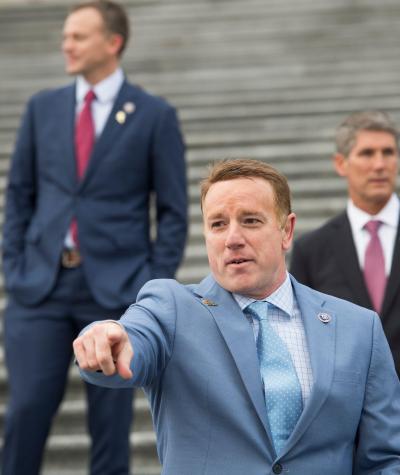A Business Insider article published on June 29, 2021 revealed that Rep. Pat Fallon (R-T.X.) failed to properly disclose 93 stock trades worth between $7.8 and $17.53 million dollars in January through mid-April of this year in violation of House ethics rules and federal law.
With his failure to disclose these stock transactions, Fallon now joins a bipartisan group of members of Congress who have not provided the accountability that the public deserves.
Under the federal law known as the Stop Trading on Congressional Knowledge Act (STOCK) Act, members of Congress have 30 days after becoming aware of a stock trade to disclose it in a formally certified report to the clerk of the U.S. House of Representatives.
For members of the House like Fallon, failure to do so can result in an investigation by the Office of Congressional Ethics (OCE) or a fine.
The disclosure that Fallon filed with the House clerk on June 17, 2021 shows that he bought and sold the shares of 14 companies in the first four months of the year, including a company that a committee he sits on oversees.
Fallon is a member of the House Armed Services Committee. Yet he still purchased between $300,000 and $750,000 worth of Boeing stock and sold between $219,000 and $610,000 worth.
According to the Business Insider article, the committee, “conducts oversight of the government's relationship with defense contractors and frequently debates Boeing's various military aircraft and weapons systems.”
Fallon continues the bipartisan trend of failing to disclose stock trades, a basic obligation of public service. In March, Campaign Legal Center (CLC) filed a complaint with the OCE alleging that Rep. Tom Malinowski (D-N.J.) violated federal law and House rules by not filing any periodic transaction reports (PRT) within the required 45-day timeframe.
Last year, it also came to light that Rep. Donna Shalala (D-F.L.) had failed to comply with the requirements of the STOCK Act for over two years.
Due to the coronavirus pandemic, the issue of congressional stock trades became an item of national interest in spring of 2020. Several members of the U.S. House and Senate faced intense scrutiny for possibly using information about COVID-19 that they learned in private meetings to make the decision to sell certain stocks at the beginning of the pandemic.
Two key examples are Sen. Kelly Loeffler (R-G.A.) and Sen. Richard Burr (R-N.C.), who both faced investigations that were ultimately dropped without charges.
However, following the conclusion of these investigations, Loeffler lost her Senate seat and Burr voluntarily resigned from being the chairman of the U.S. Senate Committee on Intelligence so as not to distract from the committee’s work.
Even without official charges, one takeaway is that a congressional stock trade investigation can still damage the public’s trust in public officials and end or harm their careers.
Still, the continued and repeated violations show that this fact has not discouraged many members of Congress from committing such violations, proving the need need for stronger laws governing congressional stock trades.
At least some members of Congress seem to agree with CLC that members should be restricted or prohibited from trading individual stocks.
Sen. Elizabeth Warren (D-M.A.) and Rep. Pramila Jayapal (D.-W.A) have promised to introduce a bill in this legislative session that would build off the Anti-Corruption and Public Integrity Act to prohibit members of Congress and other top government officials from buying or selling stocks.
When elected officials prioritize their own self-interest—financial or otherwise—they are hurting their own accountability and eroding public trust in government. As they work to craft legislation that affects the lives of all Americans, we must create stronger incentives for members of Congress to disclose their stock trades in a timely manner.
